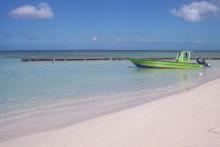The steering committee is made up of all of the heads of the partner networks. It oversees the general operations of the programme, and participates in identifying and selecting projects. It meets three times a year.
The steering committee also devises a joint capacity building strategy for the managers of overseas natural areas.
Project monitoring
- An 'opportunity sheet' is filled in and then validated by the steering committee.
- Organisations that apply to implement a project, commit to carrying it out via a bipartite agreement signed with ATEN.
- A project review is submitted to the steering committee, which ensures that the objectives are achieved.
Membership
There are 17 members on the steering committee (10 major networks of managers of French natural areas, 5 major nature conservation NGOs in France and 2 Ministries): RNF (French Natural Reserves), WWF, French IUCN committee, ATEN, PNF (French National Parks), LPO (Bird Protection Society), ONF (French National Forest Service), Conservatoire du littoral (French Coastal Protection Agency), Nicolas Hulot Foundation, FPNRF (Federation of French regional natural parks), ONCFS (French Hunting and Wildlife Agency), FCEN (Federation of natural area conservatories), AAMP (French Marine Protected Areas Agency), Rivages de France (French shores agency), FCBN (National Botanic Conservatories of France), MEDDE (French Ministry of Ecology, Sustainable Development, and Energy), and the MOM (French Overseas Ministry).











